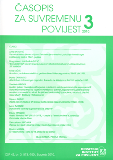Atentat na britanskoga brigadira Roberta de Wintona u Puli 10. veljače 1947.
ASSASSINATION OF BRITISH BRIGADIER ROBERT DE WINTON IN PULA, FEBRUARY 10, 1947
Author(s): Darko DukovskiSubject(s): History
Published by: Hrvatski institut za povijest
Keywords: Istria; Pola; Brigadier Robert de Winton; Maria Paquinelli
Summary/Abstract: The end of World War II did not bring peace in Istra and Croatia. During the first two years after the war the fierce battle was fought for the possession of Istria. Istria was divided into zones “A” and “B” and the Peace conference had to decide whether it would belong to Italy or to Yugoslavia. The majority of Istrian Italian population wanted to remain within Italy and whole Slovenian and Croatian population of Istria wanted to be united with Yugoslavia. The conflict between the Italian and Yugoslav option was not fought with words and public political manifestations only and it quickly spread to mutual attacks. The assassination of the Allied commander of Pola garrison was a symbolic act of refusal of the defeated Italian forces to accept the Allied decision to hand over Pola and Istria to the Yugoslav state. Maria Pasquinelli, a fanatical admirer of Benito Mussolini and fascism was an ideal representative of such Italian forces. From her perspective the assassination of the Allied commander was an act of her own free will and action and her side of the story was presented in Rosanna Turcinovich Giuricin’s book La giustizia secondo Maria: Pola 1947: la donna che sparò al generale brigadiere Robert W. De Winton. British documents presented in this article show that Pasquinelli did not act independently. Instead is seems that the assassination was planned and had a support of an organized structure.
Journal: Časopis za suvremenu povijest
- Issue Year: 42/2010
- Issue No: 3
- Page Range: 671-691
- Page Count: 21
- Language: Croatian

